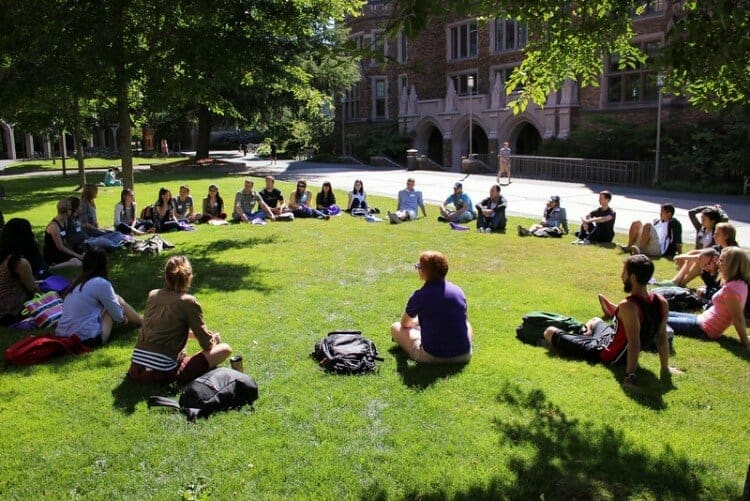It was a small study, really — the seed of research to examine political beliefs among college students and the bridging of partisan divides.
Noting that conservative students in particular, might feel isolated on campus, in 2017 the University of Washington’s Jonathan Kanter and his students designed a half-day workshop to help a couple dozen participants understand each other better, then followed up a month later to see how their opinions about political “others” had changed, if at all. Kanter, a research associate professor of psychology who studies how to help people improve their relationships, thought he might be able to use the data to inform a future study, perhaps expand the workshops and reach more people. The research, focused on improving empathy and connection among college students of different political persuasions, published in October in the Journal of Contextual Behavioral Science earlier this fall and spread quickly through the world of conservative media.
Kanter said he hadn’t sought any media coverage, believing the study sample too small to justify widespread attention. And the coverage the study did receive, which Kanter said took several statements from the article out of context, seemingly gave voice to the very biases and prejudices he was trying to work against.
“Our study was about trying to improve relations between people on opposite sides of the political spectrum, and it worked fairly well,” Kanter said, “but the media picked up on and ran with this idea that liberal students simply hate conservatives, which really wasn’t the point.”
Published in October in the Journal of Contextual Behavioral Science, the study described the workshop Kanter and his team designed. The half-day session relied on an intervention model that promotes awareness of people’s personal histories as a way of understanding their politics, and fosters positive personal interactions to combat prejudices. Conducted in the summer of 2017, the study — called “Healing the Political Divide” — drew 23 UW students. Of these, five students who identified as conservative and five who identified as liberal were assigned to do a workshop together. The other students served as various controls.
During the workshop sessions, participants did not focus on political ideology until the end. Instead, the focus was on discussing life experiences that informed their beliefs and values, and simply getting to know each other in a personal way. Participants were surveyed before, immediately after, and a month following the workshop to gauge their feelings about conservatives and liberals. Questions ranged from those about workshop expectations to those that measured levels of political Manichaeism, a good-versus-evil framing of political beliefs — such as the level of agreement with a statement, “The country would be better off if most liberals just packed up and left,” for example.
“There was a grain of truth in what the media said, in that the liberal students were a bit higher than the conservatives on political Manichaeism before the workshops,” Kanter explained. “Just as conservative media often portrays liberals inaccurately, liberals are also guilty of negatively and inaccurately stereotyping average conservatives because of what their own media feeds them.”
Kanter and his team, led by graduate student Katherine Manbeck, found that immediately after the workshop, almost all participants had substantially improved attitudes about people with different political ideologies. According to the study, students “expressed surprise that the workshops did not deteriorate into arguments,” felt closer to their fellow participants and would recommend the workshop to others.
But those effects didn’t last, Kanter said, at least not for political beliefs on the whole.
The surveys a month later showed that, while participants continued to hold positive views of the other students in the workshop, in general they didn’t sustain the same degree of understanding of, let alone affinity for, conservatives or liberals.
“The workshop had a nice effect on participants’ attitudes toward each other, and that effect lasted,” Kanter said, “but after spending a month soaking up all the news and current events, previous attitudes about others in general essentially snapped back into place.”
This may be the crux of the issue, he added. Today’s strident, emotional political environment may eclipse people’s ability to cultivate a lasting, peaceable understanding of opposing points of view writ large. The media coverage of Kanter’s own study drove that point home.
“We made the point in our study that the current political climate is so toxic, it is almost impossible to reach out and connect with those who are different from you right now. And the media sort of proved that point,” Kanter said. “It is too bad, because the students we worked with in this study are all pretty cool individuals once you get to know them, and trying to connect with and understand each other is important.”
Inroads, though, start somewhere. In their study, Kanter and his co-authors noted that even a short-term detente based on personal acquaintance — such as that created in the study — can, for instance, ease family get-togethers or other group-oriented situations. Kanter said he’d like to expand the workshops to larger, even more diverse groups. The political climate, after all, hasn’t changed.

